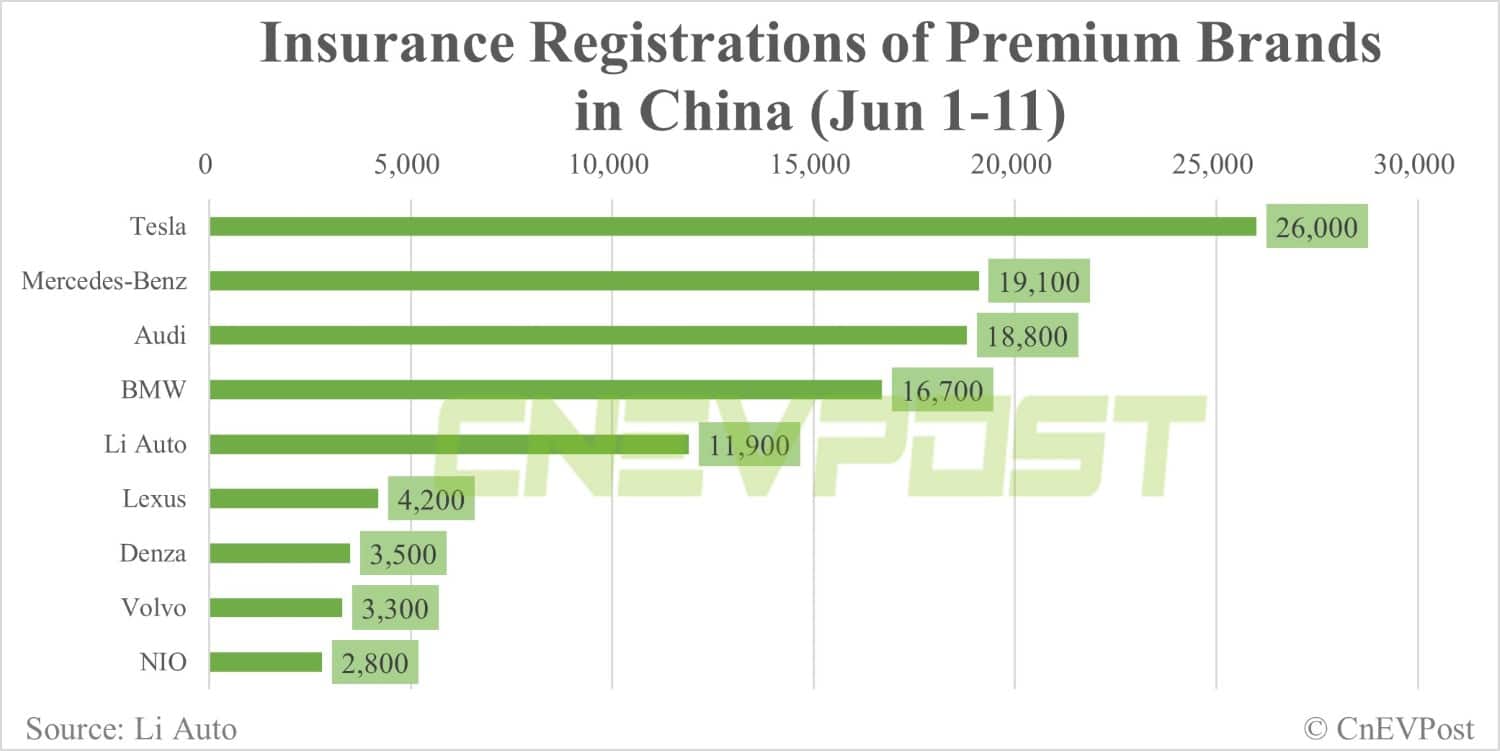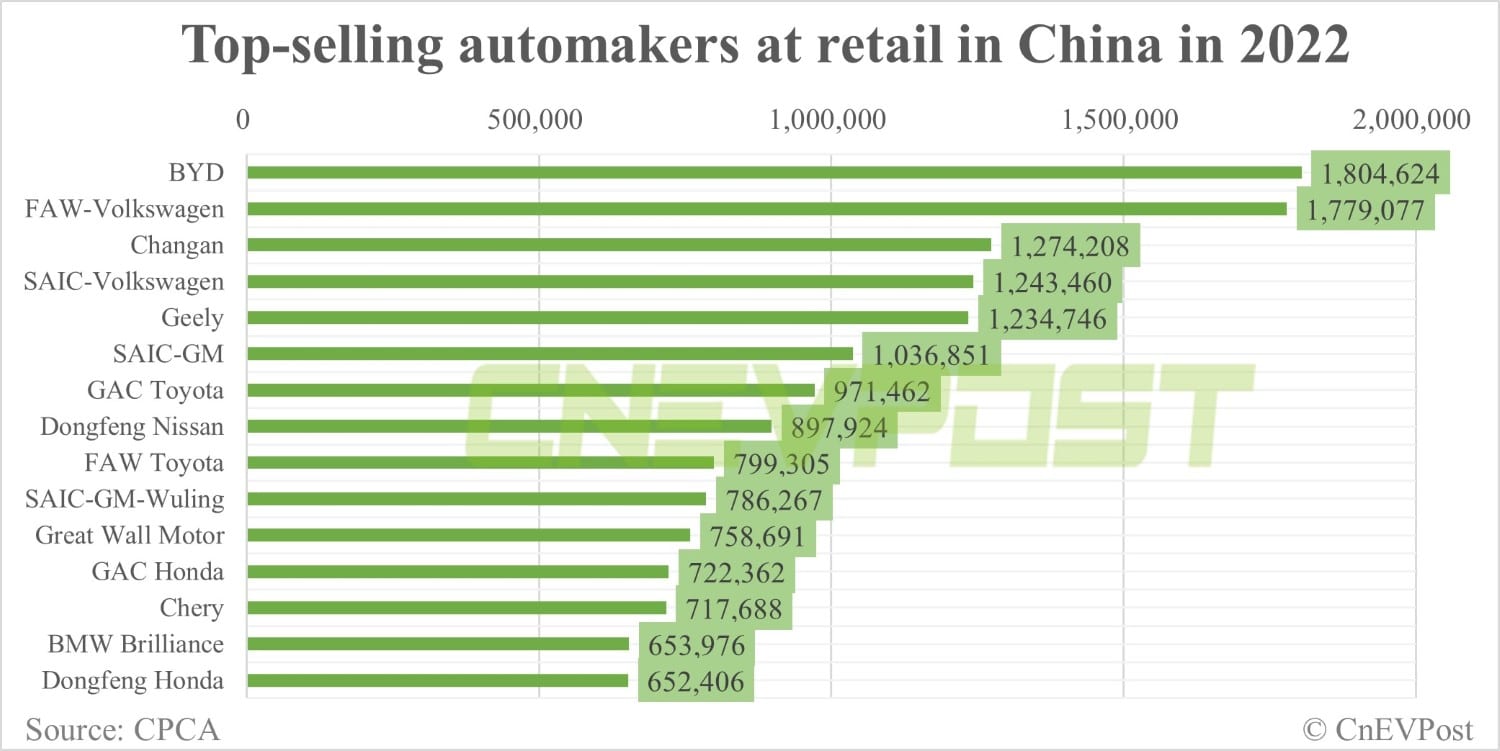Li Auto CEO looks down on local peers, arguing that their sales are so low that they don't deserve to be taken seriously.
Li Auto (NASDAQ: LI), the buzzy Chinese car-making startup, has set an ambitious goal -- to outsell German luxury brands in 2024.
"With the delivery of the all-electric model and next year's Li L6, we are confident that we will surpass BBA in our total sales in 2024," the company said on Weibo yesterday while sharing insurance registration figures for last week.
"BBA" in China refers to German luxury brands Mercedes-Benz, BMW and Audi, and Li Auto appears to be aiming to outsell one of those three brands in China next year, though it didn't specify.
For reference, BMW Brilliance, BMW's joint venture in China, had retail sales of 653,976 units in 2022, essentially unchanged from 651,236 units in 2021 and ranked 14th in the China Passenger Car Association's (CPCA) top 15 sales ranking.
BYD and FAW-Volkswagen are the top two in the ranking, with 1,804,624 and 1,779,077 units sold in 2022, respectively. Mercedes-Benz and Audi did not make the list.
From January to May this year, BMW Brilliance's retail sales were 274,763 units, up 9.1 percent from 251,880 units in the same period last year, placing it at No. 9 in the CPCA's latest top 10 sales ranking. Mercedes-Benz and Audi are still not on the list.
Li Auto yesterday shared vehicle insurance registration figures showing it sold 8,400 vehicles in the week of June 5 to June 11, bringing the cumulative sales so far this month to 11,900.
As of June 11, Li Auto had sold more SUVs than any of the "BBA" brands in China this month with just three SUVs, it said.
All of Li Auto's models currently on sale are extended-range electric vehicles (EREVs), essentially plug-in hybrid vehicles (PHEVs), including the five-seat Li L7 and the six-seat Li L9 and Li L8.
The company is expected to launch its first all-electric model by the end of the year, which will be an MPV (multi-purpose vehicle, or van) powered by the latest Qilin Battery from Chinese power cell giant CATL.
On September 22, 2022, in a warm-up for the Li L8's launch in a few days, Li Auto said it will also launch the Li L6, a midsize five-seat SUV priced within RMB 300,000 yuan ($41,850).
As it eats into the German luxury carmaker's market, Li Auto is continuing to learn from the strengths of these established luxury brands.
"In the offensive ground game, the role models are of course the BBA, which are the best sellers in the market priced at RMB 300,000 and up. we learned from them how to open 4S stores, how to choose locations, and reduce customer acquisition costs to 1/5 of stores located in malls," Li Auto founder, chairman and CEO Li Xiang said on Weibo yesterday.
Li Auto also learned from these German luxury car companies how to operate in Shanghai, which does not offer free NEV license plates for EREVs, and boosted the company's sales in Shanghai to a peak in 2022 in one month's time, he said.
Before this year, Shanghai offered free license plates to consumers who bought NEVs, including battery electric vehicles (BEVs) as well as PHEVs.
Starting this year, only consumers who purchase BEVs will receive free license plates in Shanghai, while PHEVs, including EREVs, will not be eligible for the benefit.
In Li Auto's view, its only competitors are German luxury car companies, and local brands are not worth mentioning.
After the company shared its insurance figures for last week yesterday, it was accused by a Weibo user of the move as a continued attack on its local peers.
In response to the Weibo user, Li said that the sales of these local peers are so low that they are not worth mentioning, and that its core focus has always been on the market where BBA is located.
Li used the Chinese saying "three watermelons and two dates (仨瓜俩枣)" to describe the sales of its local counterparts, implying that they were too far behind Li Auto.
Li Auto's two main peers, Nio (NYSE: NIO) and Xpeng (NYSE: XPEV), both registered around 1,500 units of insurance last week, with 2,800 and 2,200 units from June 1 to June 11, respectively.
It is worth noting that both Nio and Xpeng currently offer only BEVs, a fast-growing but currently small market in China.
In January-May, China's passenger vehicle retail sales were 7.63 million units, with NEVs contributing 2.42 million units, or 31.7 percent, according to the CPCA's figures.
BEVs sold 1.64 million units from January to May, contributing 21.5 percent of all passenger car sales.
($1 = RMB 7.1681)


